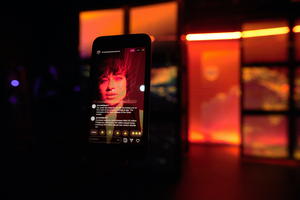Review: RICH KIDS: A HISTORY OF SHOPPING MALLS IN TEHRAN at Woolly Mammoth Theatre Company
A riveting and alarming use of technology as story itself

The British have a culture of creating plays that explore ideas rather than dramatize a series of events. Jez Butterworth's Jerusalem or Tom Stoppard's Rock 'n' Roll come immediately to mind - plays that wrestle with concepts (English identity and the diversities of passion) rather than the connect-the-dots plots of so many American plays.
I might place Javaad Alipoor and Kristy Housley's Rich Kids: A History of Shopping Malls in Tehran very much in the "theatre as exploration of ideas" camp, and it does so very well. I hesitate to even call it a "play" in any traditional sense. Is it an experience? An interaction? Whatever it is, it is definitely a glorious surprise.
Honestly, I have found myself feeling less than excited about viewing theatre online the past year. For me, it so often highlights the fact that we can't all be in a room together creating and sharing stories instead of giving me the booster shot of theatre that I need and love. Plus, I am neither rich nor a kid, nor have I been to Tehran (I realize I don't actually know much about Tehran, or even Iran in general), nor have I been to a shopping mall in quite some time. Well, my uncertainty was totally unfounded.
Rather than another second-rate streaming version of a staged play, Rich Kids takes an astonishing and masterful dive into the price of wealth, the use and ramifications of technology, and "people with all the privilege in the world and nothing but contempt for it."
The main thread of Rich Kids occurs as a streamed performance that feels more like a podcast or vlog. Rather than playing characters per se, we get the sense that performers (narrators? guides? hosts?) Javaad Alipoor and Peyvand Sadeghian are presenting an enjoyable but almost journalistic exploration of Iranian culture among the obscenely wealthy 20-somethings of today's Tehran. As things develop, they guide us to the show's Instagram feed where we meet Hossein and Parivash, a young Tehranian couple whose social-media-centric lives simultaneously begin and end in a cocaine-fueled car crash.
Our hosts guide us back and forth between the world of the streamed play, the Instagram exposé of the entitled and consumption-driven lives of the young and wealthy of Tehran (who are no different than the young and wealthy of everywhere else), and a series of Instagram live broadcasts that grow increasingly unsettled and unsettling. As we ourselves slip further down this rabbit hole, things become blurrier even as they become clearer. Alipoor and Sadeghian take us backwards through the sediments of time on a cultural dig, connecting Hossein's mangled yellow Porsche to the Gulf War, the rise of fundamentalism, the fall of the Shah, why our teeth are slightly radioactive, the layers that civilizations create and leave behind, and on and on in a direct line to Gobekli Tepe, a Neolithic structure hiding in plain sight for roughly 11,000 years in the hills of southeastern Turkey.
The striking and gasp-inducing final moment of Rich Kids is the keystone of the entire experience. What is social media? It's real in that it exists, but does it exist? How does social media create and perpetuate economic apartheid? How are we taking part in that? Do we even want to think about this constellation of causes and effects every time we look at our phones?
Alipoor and Housley's creation is the best kind of streamed "theatre". Rich Kids makes riveting, compelling, and alarming use of technology as story itself, not simply delivery mechanism. This is not just any online play but a very special and thoughtful exploration of technology and its consequences by using that technology itself.
I cannot recommend Rich Kids highly enough, and I look forward to seeing it again.
Rich Kids: A History of Shopping Malls in Tehran (running time 1 hour) is broadcast through April 18th at Woolly Mammoth Theatre Company.
Reader Reviews
Videos

